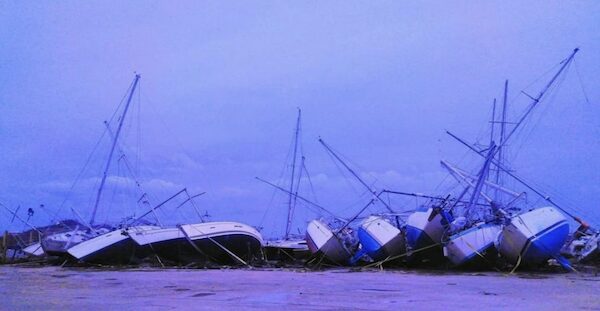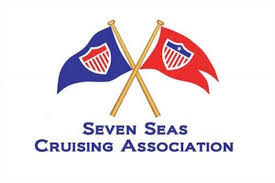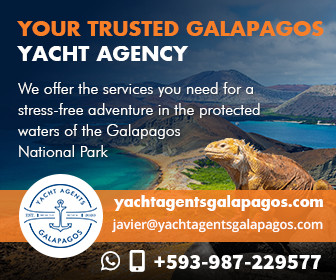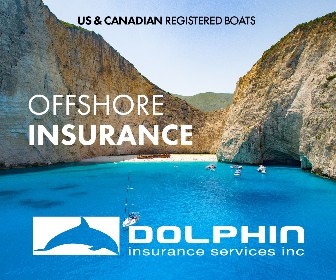Caribbean: Hurricane Beryl’s Destructive Path – How You Can Help
With so many islands devastated by the passing of Hurricane Beryl, the yachting community have joined forces to assist with urgent supplies and relief aid. In this news report we outline the current guidelines for yachts wanting to assist with bringing donated supplies to the islands and where you can donate.
Published 5 months ago, updated 3 weeks ago
See subsequent article for more info. Hurricane Beryl: Aid for both locals and cruisers
Beryl’s Destructive Path
While the clean-up had started in many of the Windward Islands of the Caribbean after Hurricane Beryl forced its way through at the start of July, Beryl continued to plough through the Caribbean hitting Jamaica as a category 4 hurricane, battering the Cayman Islands as a weakening category 3 hurricane and continuing into the Gulf of Mexico as a tropical storm. Beryl then picked up more strength and slammed into SE Texas and Lousiana as a category 1 hurricane, one week after destroying Carricou, Petit Martinique, the Grenadines and seriously affecting neighbouring islands.
Beryl became the first hurricane of the 2024 season to land in the U.S. The storm caused at least 10 deaths in the Caribbean and 8 deaths in the U.S.
Relief Web: Eastern Caribbean – Hurricane Beryl – Situation Report 09 July
Carriacou, Petit Martinique and the Grenadines worst affected
The island nations of St. Vincent and the Grenadines and Grenada are the worst affected from Hurricane Beryl in the Windward Islands, according to a report by Relief Web International through the United Nations Office for the Coordination of Humanitarian Affairs (OCHA). Barbados, Trinidad and Tobago, Saint Lucia, and Dominica also suffered severe damage.
Due to communication issues, the extent of damage in Carriacou, Petite Martinique and parts of the Northern corridor of Grenada, as well as Mayreau and Canouan, took several days to become apparent. Carriacou, Union, and Petite Martinque, had close to 98% home destruction.


Joan Conover, President of the SSCA and heavily involved in yacht relief efforts told Noonsite; “Very clearly, the communication systems of the past (SSB, Iridium), have gone by the wayside to cell service/data and internet usage in the islands. Radio usage is limited. We saw that during Hurricane Maria in 2017/2018, but now the migration is complete. Local governments heavily depend on internet messaging to get information out to the public, but they do not seem to have communications for emergencies, or if they do, they were/are not available. There appears to be no real system for any outer islands – other than volunteers with Starlink. This disaster has been worse for communications than years past, due to shift to new technology that expects internet and cell towers.”
Dickon Mitchell, Grenada’s prime minister, described the islands’ situation as “grim” immediately after the passing of Beryl, with power almost entirely cut off, untold numbers of houses destroyed and unpassable roads. Samaritans Purse very quickly flew a cargo plane into Grenada with 24 tons of supplies and 13 disaster managment personnel.




Yachties Helping Out
The devastation caused by Hurricane Beryl left countless families without homes, food, and basic necessities. The impact on the communities that countless cruisers know and love has been profound, creating an urgent need for immediate relief.
In response, Hope Fleet has been collaborating with the Seven Seas Cruising Association (SSCA) to provide essential aid to the affected islands.
Hope Fleet have been raising funds to procure supplies, which are being delivered by private vessels to those in need. This initiative leverages the unique capabilities of yachts to access areas that may be inaccessible by air or commercial shipping at this time.
Hope Fleet and SSCA have a combined network of private boaters already in the vicinity ready to transport critical aid directly to affected areas.
Joan Conover reports; “We are so pleased with Hopefleet and the team’s hard work. SSCA has some boats, local points of contact and a network of supportive people, but Hopefleet.org can provide the organisation and assistance to take this from “herding cats.
“Then there is Jesse James and Trinidad who are always ready to stand up and help. They are a tremendous resource, almost single-handed from a country point of view. Hundreds of cruisers got to last minute safety when they left islands in the hurricane impact zone and arrived in Trinidad. They had no exit papers, pets on board, etc., yet Trinidad – due to the emergency – waived paperwork and opened offices out of hours and on weekends. Amazing support to the entire Grenada and SVG communities. Now Trinidad and others are sending aid, short-term, to get food/water to desperate areas.
“In the future it is hoped Hopefleet can work its magic with an umbrella for small boats/manifests and governments, so impacted areas can more easily get support.”
To make a donation or for boaters who wish to get involved, please visit:
Danny Moroney, President and CEO of Hope Fleet says “We are in communication with our partner NGO’s to set up ongoing supply chains in surrounding islands and asking cruisers to assist with local transport to affected areas. Until that is firmed up, however, we are assisting vessels who are already underway or purchasing supplies on their own and pointing them in the right direction.
“It’s come to our attention that it would be easier for customs/contacts to receive goods if item lists were organized ahead of time. If vessels sign up with us and already have goods they are looking to transport, they can email us at oceanreach@hopefleet.org with their vessel name, along with the list of items they are bringing and we will organize and send back our “Notice of Arrival” and “Manifest” documents to accompany them. We send these documents with all of our vessels and links of samples can be found below.”
Doyle Guides: Recommendations for Yachts Sailing with Supplies

Conditions on the ground in the affected islands are still chaotic, but starting to get organised – slowly. Donations of goods should be brought to an organization with a fair, secure, and established distribution system. If you want to sail to affected areas to deliver donations, we recommend you do this under the guidance of an official organization, such as Hope Fleet, NaDMA, MAYAG and NEMO.
If you do decide to sail to affected areas to deliver donations without the guidance of an official organization please keep in mind that these islands are still in a state of upheaval, and secure storage and equitable distribution are major concerns. Blindly leaving donations ashore unattended or without direction could result in potential looting and unfair distribution. There are still conflicting reports, even between Government officials of the same country. Be aware that any aid you attempt to deliver on your own, may not be in line with Government regulations.
For continually updated guidelines for yachts coming to Carriacou, Petit Martinique and St. Vincent and the Grenadines with donated supplies, see Information by Doyle Guides on Hurricane Beryl Relief Efforts. Lexi, of Doyle Guides, is doing an excellent job of keeping this information continually updated, particularly with info pointing yachts people towards on-the-ground organizations that are coordinating yacht-based relief efforts, as well as providing a detailed list of recommended disaster funds.
Items Currently Needed
Items currently needed, according to Grenada’s National Disaster Management Agency (NaDMA), can be found listed on the Doyle Guides Beryl Relief page.
Useful Advice for Yachts Assisting (from SSCA)
- Be aware there can be bad actors, go in – drop off – and leave. DO NOT take victims on board and transport to another island. And unless you know who someone is, its recommended to keep your boat private.
- There are no working toilets, use your boat. There are limited sources for drinking water, use your boat water. There are no resources for any boats coming in. Bring everything you need (self contained).
- Fuel. There is no fuel on the damaged islands except for Grenada and maybe SVG. Grenada Yacht Club has fuel, boats should plan to do a touch, fuel and go there.
- Water. There is no water. If you use R/O be aware junk and oil in water can kill membranes, only make water in clean areas – not in the harbors. If water purification tablets are available use them, or bleach.
- Debris in the ocean. There is a tremendous amount of debris from the hurricane. It’s in the water in harbors and mainly on the west side of islands where currents and winds blow them. Keep a good lookout, don’t enter harbors at night. Have a person on the bow as if you are entering a coral reef. Tin roofs, cars, containers can all be in the water as well as house debris. Anything that was on land..can be in the water. This is for all boats transiting.
- Wear shoes, never go barefoot—you can get terrible infections from the sewage everywhere.
- Bleach. Be aware the ground/water is contaminated. Make a bleach dip for shore shoes, and wash hands, well, all the time. Make a dip solution on deck, and use it prior to entry to deck of boat.
- Denge Fever etc. Use good DEET mosquito repellent and take some for the locals. If you don’t have current tetanus vaccinations, think about getting them. With lots of stagnant ground water there are more bugs than normal. Stay protected and use screens on your boat.
- Gloves and Masks. Both locals and boaters likely need gloves (latex type) and a mask to help with the smell of sewer, trash and burning (they burn to cook, they will be burning to clear).
- Bring heavy duty trash bags to help with debris pick up, heavy gloves, shovels, buckets etc.
Where can I donate?
- High Commission For Grenada relief fund
- A general Union Island GoFundMe campaign is here.
- A general Carriacou & PM GoFundMe campaign is here and here.
- The Marine & Yachting Association of Grenada has set up Gofund me: https://gofund.me/c53f6778
- Doyle Guides have a very expansive list of relief funds on their Beryl Relief page.
- The Grenadines Initiative, a charity registered in Canada to provide social support to the windward islands, is participating in Beryl disaster relief throughout the Grenadines. Go here to donate.
Be careful of scams. The Red Cross are not on the ground and there have been reports of many fake Go Fund Me accounts.
………………………………
Related News:
- Hurricane Beryl: Recovery Aids Continue
- Hurricane Beryl: Aid for both locals and cruisers
- Relief Web: Eastern Caribbean – Hurricane Beryl – Situation Report 09 July
- Response Underway as Hurricane Beryl Cuts a Devastating Path Across the Caribbean – Direct Relief
- Relief Web International – Hurricane Beryl Relief Update
- Windward Islands Face Serious Threat from Hurricane Beryl – Noonsite
………………………………
Related Links:
- Doyle Guides Beryl information
- Caribbean Compass Hurricane Beryl Page
- Natural Disasters: Advice for Cruisers Who Want to Help
- National Hurricane Center
- The Facebook page Hurricane Beryl – Grenada and Carriacou Updates has lots of images and information.
………………………………
Find out all news, reports, links and comments posted on Noonsite, plus cruising information from around the world, by subscribing to our FREE monthly newsletter. Go to https://www.noonsite.com/newsletter/.
Related to following destinations: Barbados, Bequia, Blue Lagoon, Bowden Harbour/Port Morant, Bridgetown, Britannia Bay - Lovell, Canouan, Cayman Brac, Cayman Brac (Creek), Cayman Islands, Chateaubelair, Clarkes Court Bay, George Town, Grand Cayman, Grenada, Grenville, Hog Island, Jamaica, Kingston, Kingstown, Little Cayman, Little Cayman (Port), Mayreau, Montego Bay, Mt Hartman Bay, Mustique, Ocho Rios, Oracabessa, Ottley Hall, Petit Martinique, Port Antonio, Port Egmont (Le Phare Bleu Bay), Port Elizabeth (Bequia), Prickly Bay, Sauteurs, St. Davids, St. George's, St. Vincent, St. Vincent & the Grenadines, The Grenadines, Tobago Cays, True Blue Bay, Tyrell Bay & Hillsborough (Carriacou), Union Island, Wallilabou Bay, Young Island Cut
Related to the following Cruising Resources: Cruising Impact, Hurricanes and Tropical Cyclones, Volunteer Projects for Cruisers, Weather






